renewing AGOA: Critical Challenges South Africa Faces
In the complex world of international trade, agreements like AGOA play a pivotal role in shaping economic relationships. renewing AGOA offers African nations, especially South Africa, the opportunity to access U.S. markets duty-free, fostering growth and investment. As the program nears its 2025 expiration, South Africa faces an urgent race against time to secure its trade advantages.
1. Understanding AGOA’s Background
The African Growth and Opportunity Act (AGOA) was established in 2000 to strengthen trade and investment ties between the United States and eligible African countries. For South Africa, AGOA has been instrumental in boosting exports, supporting industries from automotive to agriculture, and creating jobs. Renewing AGOA is crucial to maintaining these economic benefits.
2. Current Challenges in Negotiations
South Africa now faces mounting pressures as tariffs and trade restrictions loom. Recent proposals from U.S. officials indicate potential barriers that could impact the country’s export sectors. Experts warn that delays in negotiations may result in economic setbacks, emphasizing the urgency of effective diplomacy in renewing AGOA.
3. Government Strategies and Actions
South Africa’s Department of Trade and Industry is actively engaging with U.S. counterparts to secure a renewal deal. Led by Trade Minister Parks Tau, multiple negotiation rounds are scheduled to address both tariff structures and sector-specific concerns. External insights from Reuters highlight ongoing developments that could shape the outcome of renewing AGOA.
4. Economic Importance for South Africa
renewing AGOA is critical for sustaining South Africa’s economic stability. Key sectors such as automotive, agriculture, and manufacturing heavily rely on duty-free access to U.S. markets. Losing AGOA privileges could result in job losses, decreased export revenues, and broader economic challenges.
5. International Perspectives
While South Africa negotiates with the U.S., other global players, including China, are showing increased interest in expanding investments in the country. These opportunities in mining, energy, and infrastructure provide alternative pathways, yet they cannot fully replace the benefits of renewing AGOA. South Africa must balance multiple international interests to protect its economic future.
6. Future Outlook
Analysts caution that time is a critical factor in renewing AGOA. Despite the pressures, there is cautious optimism that an agreement can be reached before the program’s expiration in September 2025. Strategic negotiations, backed by robust economic planning, are essential for maintaining trade continuity. For more insights, our internal report on trade policies provides a detailed overview of the government’s approach.
7. Sector-Specific Impacts
renewing AGOA will have profound effects on South Africa’s automotive and textile industries. Export-oriented companies have invested heavily to meet U.S. standards, and any disruption could affect supply chains and international partnerships. The stakes are high, making successful negotiations essential.
8. Political and Diplomatic Factors
Negotiations are influenced not only by economic metrics but also by political dynamics. Maintaining strong diplomatic ties with U.S. lawmakers and stakeholders is critical for advancing South Africa’s position in renewing AGOA. Public and private sectors alike are engaging in advocacy and dialogue to ensure favorable terms.
9. Alternative Trade Opportunities
While renewing AGOA remains a priority, South Africa is exploring additional trade agreements with Europe, Asia, and Africa. Diversifying trade partners helps mitigate risk and ensures that the country is not overly dependent on a single market. Strategic partnerships complement the benefits of renewing AGOA.
10. Long-Term Strategic Planning
South Africa is leveraging economic data, industry feedback, and policy analysis to develop a long-term strategy around renewing AGOA. By aligning trade policy with domestic growth objectives, the country aims to secure sustainable benefits that extend beyond immediate negotiations.
Conclusion
renewing AGOA represents both a challenge and an opportunity for South Africa. The outcome of these negotiations will influence key sectors, international relations, and the overall economic trajectory. With careful planning, strong diplomacy, and timely action, South Africa can secure the advantages of AGOA for years to come.




